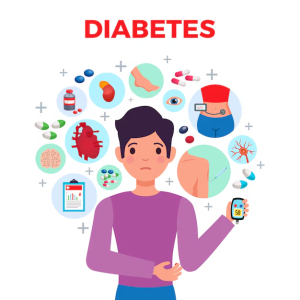Diabetes
Diabetes is a chronic medical condition characterized by the body’s inability to regulate blood sugar (glucose) levels properly. This regulation issue occurs either because the pancreas does not produce enough insulin (a hormone that regulates blood sugar) or because the body’s cells do not respond effectively to insulin. There are three main types of diabetes: Type 1, Type 2, and gestational diabetes.
Symptoms of Diabetes:
- Increased Thirst and Frequent Urination: Excess glucose in the blood causes more fluid to be drawn from the tissues, leading to dehydration and increased thirst.
- Unexplained Weight Loss: Despite eating normally or even more, individuals may lose weight due to the body’s inability to use glucose effectively.
- Fatigue: Lack of glucose in the body’s cells can result in persistent tiredness and fatigue.
- Blurred Vision: High blood sugar levels can cause swelling in the lens of the eye, leading to vision changes.
- Slow-Healing Sores or Frequent Infections: High glucose levels can impair the body’s ability to heal and resist infections.
- Tingling or Numbness: Particularly in the hands and feet, a result of nerve damage due to prolonged high blood sugar levels.
Therapies and Treatments:
- Medications:
- Insulin Therapy: Essential for Type 1 diabetes and sometimes required for Type 2 diabetes. Various forms include rapid-acting, long-acting, and intermediate-acting insulin.
- Oral Medications: For Type 2 diabetes, such as metformin, sulfonylureas, or SGLT2 inhibitors, which help improve the body’s insulin use or reduce glucose production.
- Lifestyle Modifications:
- Dietary Changes: A balanced diet with controlled carbohydrate intake, focusing on whole grains, vegetables, and lean proteins.
- Regular Exercise: Physical activity helps lower blood sugar levels and increase insulin sensitivity.
- Weight Management: Maintaining a healthy weight can improve insulin sensitivity and overall health.
- Blood Sugar Monitoring: Regular monitoring of blood glucose levels is crucial for managing diabetes and adjusting treatment plans.
- Education and Support: Diabetes education programs can help patients understand how to manage their condition, including the importance of medication adherence, diet, and exercise.
Important Considerations:
- Complications: Long-term, uncontrolled diabetes can lead to serious complications such as cardiovascular disease, kidney damage, nerve damage, eye problems, and foot issues.
- Preventive Measures: For Type 2 diabetes, preventive measures include maintaining a healthy diet, regular physical activity, and regular screening, especially for individuals at risk.
Current Research and Developments: Ongoing research focuses on new treatment methods, including advanced insulin delivery systems, artificial pancreas technology, and potential cures through gene therapy and immunotherapy. These efforts aim to improve the quality of life and outcomes for individuals living with diabetes.

Contact Us To Get Consultations
SANJEEVANI WELLNESS HOME
A sanctuary of holistic healing and rejuvenation, offering personalized wellness programs, expert care, and a serene environment to restore balance and vitality.
#1044, 59th C Cross Rd, beside golden heights mall, 4th M Block, Rajajinagar, Bengaluru, Karnataka 560010.
Important Links
Office Hours
Monday – Sunday
8:00 am – 8:00 pm

